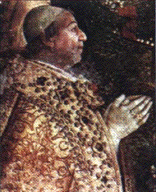August 11: Pope Alexander VI
Alexander VI (1492)
It was on this date, August 11, 1492, that Rodrigo Borgia was elected Pope Alexander VI. That he lived lavishly, showered gifts and offices on his relatives, kept mistresses and fathered children while occupying the chair of Peter, and was indifferent to his church duties – all documented in detail by contemporary witnesses and attested even by the churchman Ludwig Pastor and the Catholic Encyclopedia – is beyond dispute. Yet, if you were to rely on such sources as the Columbia Encyclopedia or the Encyclopedia Britannica, you would get only partial truths.
For example, the Columbia Encyclopedia says, "Recent studies tend to minimize the pope's immorality and stress his solid achievements as a political strategist and church administrator." In fact, his political strategies were twofold: duplicity and greed; his church administration consisted of corruption and nepotism.
Born near Valencia, Spain, on 1 January 1431, Rodrigo borrowed the Borgia name from his mother's family. Pope Callixtus III helped his nephew's ecclesiastical career, and Rodrigo became a cardinal at age 25. This and other offices he held simultaneously, assured his fortune, and his loose and luxurious lifestyle drew a reprimand from Pope Pius II in 1460. Nevertheless, his passion for sexual liaisons continued with Vanozza Catanei, who bore him four children, including the fascinating Lucrezia Borgia (born 1480). After his elevation to the Papacy in 1492, through heavy bribery and politicking, he put aside Vanozza for the beautiful fifteen-year-old Giulia Farnese – Alexander was then 61 – by whom he almost certainly had two children while Pope, making six children in all.
Alexander created numerous cardinals – for a price – most of whom were "of doubtful reputation" (according to the Venetian envoy to Rome), or relatives, or usually both. These included his unscrupulous son Cesare; another was the brother of his mistress, who became known as "the Petticoat-Cardinal" (Il Cardinale della genella); a third was Ippolito d'Este, who some years later had the eyes of his bastard brother cut out because his own mistress admired them.
Alexander never changed his womanizing ways until he was too old to indulge them – he died at age 72 – and participated in extraordinary orgies held in the Vatican. A contemporary named Johann Burchard, who lived in the Vatican, wrote in his Diary for 30 October 1501, that the Pope skipped Vespers, but that evening dined with his daughter Lucrezia, his son Cesare, and fifty prostitutes in the Vatican. "The women, after the banquet, danced unclothed. In one dance they had to flit, nude, between lighted candles and pick nuts from the floor. [The evening ended with] the 'Vicar of Christ' and his daughter distributing prizes of silk garments to those servants of the Vatican who 'had had carnal intercourse with the courtesans the largest number of times'."
The since-redacted 11th edition of the Encyclopedia Britannica said, "A characteristic instance of the corruption of the papal court is the fact that Borgia's daughter Lucrezia lived with his mistress Giulia." Indeed, Pinturicchio painted a likeness of Giulia ... as the Virgin Mary! Giulia remained Alexander's mistress throughout his pontificate, bearing him a son when the Pope was 65.
Admitting most of this, the Catholic Encyclopedia still does the best it can for Alexander: it quotes Pope Leo I, saying, "the dignity of Peter suffers no diminution even in an unworthy successor" (cujus dignitas etiam in indigno haerede non deficit). Thus we must lower our expectations for the most corrupt and immoral cleric in the history of the Papacy, as long as he is representing God on earth!
Originally published August 2003 by Ronald Bruce Meyer.


